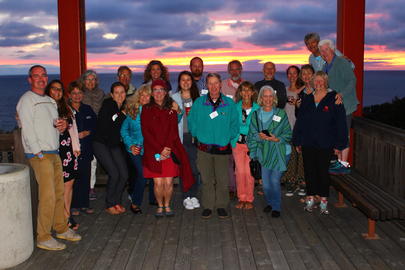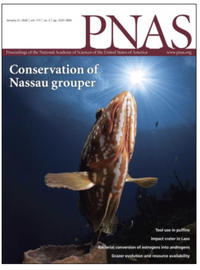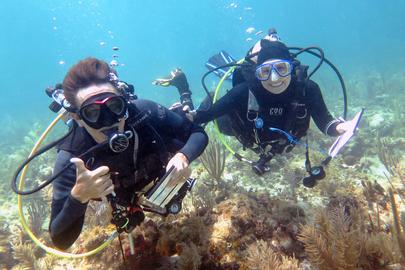REEF Volunteer Fish Survey Project data were used in this publication to help elucidate annual mean abundance in Goliath Grouper at sites off the southeastern coast of Florida. The authors further used the data to look for probable spawning sites. The data showed the buildup of the Goliath Grouper population in the spawning area off SE Florida over time. However, there was insufficent survey effort to demonstrate a pattern off SW Florida.
Last month we successfully conducted our 19th year of the Grouper Moon Project. Around the winter full moons each year, our field team joins forces in the Cayman Islands to study one of the last remaining, and largest currently known, spawning aggregations of the endangered Nassau Grouper. Since 2001, REEF and the Cayman Islands Department of Environment have collaborated on this project.
To celebrate our sustaining donors and most active volunteer surveyors, we annually host REEF by the Sea during the first weekend in March. This year's celebration took place earlier this month in San Diego, California. This invitation-only event included three days of presentations, socials, and guided tours of facilities around the Scripps Institution of Oceanography campus.
This work was presented at the OCEANS19 meeting, and was a result of research done as part of the Grouper Moon Project. More than 800 species of fish produce sound including Red Hind (Epinephelus guttatus), Nassau Grouper (E. striatus), Black Grouper (Mycteroperca bonaci), and Yellowfin Grouper (M. venenosa). Their sounds can be used to monitor these fish and may be a means to estimate abundance if parameters such as source levels, detection probabilities, and cue rates are known.
This paper summarizes research done as part of the Grouper Moon Project to understand sound made by several species of grouper. Many fishes produce calls during spawning that aid in species and mate recognition. When multiple sound-producing species inhabit an area, the detection range may decrease and limit call function. Acoustic partitioning, the separation of calls in time, space, or spectral frequency, can minimize interference among species and provide information about fish behavior and ecology, including possible response to increasing anthropogenic noise.
We are excited to share a conservation success story for the critically endangered Nassau Grouper. After nearly two decades of research and monitoring efforts, the Grouper Moon team published key results last month in the prestigious journal Proceedings of the National Academy of Sciences.
The Cayman Islands Department of Environment needs to assess the effectiveness of Nassau grouper (Epinephelus striatus) spawning aggregation site closures by gaining a better understanding of how local grouper populations use the ag- gregation sites. During the January 2005 spawning season thirty Nassau grouper were acoustically tagged off the Little Cayman west end aggregation site and during the summer of 2005 an additional twenty Nassau groupers were tagged around Little Cayman.
Nassau Grouper (Epinephelus striatus) were historically one of the most important shallow water fisheries in the Caribbean, yet now are rarely taken. Although normally solitary, during the winter full moon Nassau grouper attend aggregations at spawning site to reproduce. Now, however, there are only a handful of known Nassau Grouper aggregations with more than 1,000 fish left in the Caribbean. Why has the species declined so precipitously, and what can be done to reverse the trend?
This paper presents exciting results from the Grouper Moon Project, documenting conservation success for endangered Nassau Grouper. Results of the analysis showed that on both Little Cayman and Cayman Brac in the Cayman Islands, Nassau Grouper spawning aggregations have more than tripled in response to adaptive management by the Cayman Islands government over a decade.
As 2020 gets underway, here are a few 2019 highlights from the Volunteer Fish Survey Project, REEF's citizen science marine life monitoring program, as of Jan 5, 2020.*
698 volunteer surveyors conducted and submitted 11,065 surveys in 2019. This number will definitely rise as members catch up on their backlog of data entry.
An additional 1,329 surveys were submitted in 2019 that were conducted in previous years.




